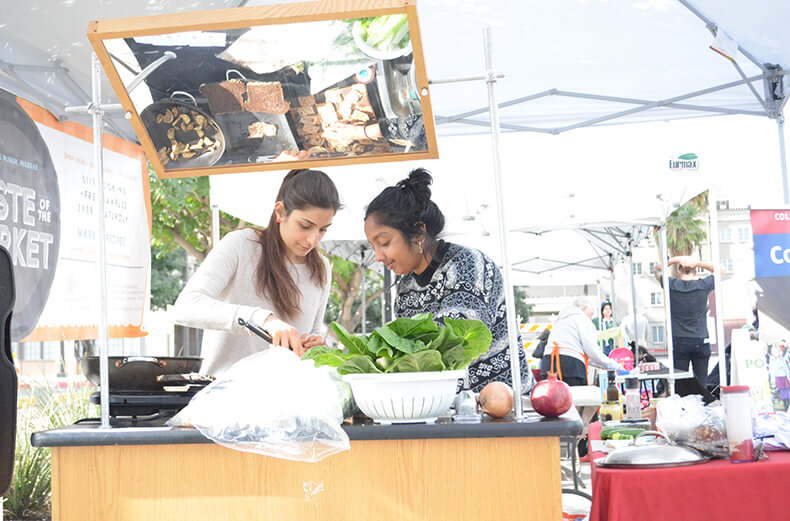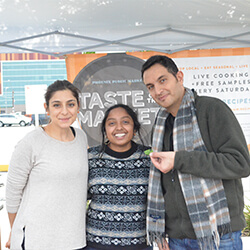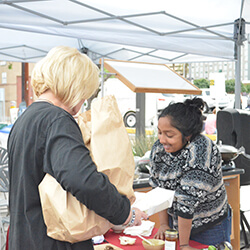
Medical Students Create Healthy Recipes at Phoenix Public Market

Medical students at the University of Arizona College of Medicine – Phoenix are stepping away from their textbooks for the weekend and into the kitchen.
The Culinary Medicine Interest group has partnered with Phoenix Open Air Market to provide free cooking demonstrations to market attendees. Every third Saturday of the month from 11:0 a.m. to 1:00 p.m., students will cook recipes using locally sourced ingredients and teach public market participants how the foods can improve their health.

“The Open Air Market is a great setting to spark discussion around healthy food and local sourcing,” Bagchi said. “Making good choices consistently is hard in our current food climate, but I wanted to show people, and myself, that it’s possible to make healthy, nutrient-packed, yummy food quickly and have it be locally sourced.”
Medical students planned and cooked recipes based on market vendors that day. The students made almond butter and honey sandwiches, eggplant or cucumber and hummus on pita bread, and a salad with microgreens and pomegranate seeds with a honey mustard vinaigrette.
Qubain said she is looking forward to introducing more creative recipes at the market in the months to come and hopefully that will prompt more community participation.
“I hope people learn that healthy recipes can be both delicious and indulgent,” she said. “Additionally, recipes can be simple and not time consuming even if they are a combination of healthy and delicious food.”
About 95 percent of the ingredients used in the cooking demonstration were purchased through vendors at the market. For example, a sandwich included bread from Noble Bread, the apples were from Community Exchange and the honey was from AZ Beekeeper.
“The main goal was teaching people about healthy ingredients and how to put them together, but I also hope they learned a bit about the people behind the products,” Bagchi said. “Leeann and I had so many conversations with each vendor about their food, and I hope people were able to go back to those vendors and learn more about their stories.”

“A lot of people go to the public market. It is a great forum for local farmers, local vendors and people to focus on community,” Dr. Marvasti said. “A big part of farmers markets is not only getting tasty food, but also getting food that is nutritious. We want to make that link between how food can not only be something that you enjoy eating as a foodie, but it can be something that can help you treat and prevent disease.”
Dr. Marvasti said the standard American diet is about 60 percent processed food, 30 percent animal protein, and a small sliver is plant based. However, to live a healthy lifestyle, the standard diet needs to be majority plant-based. He hopes that through the market, medical students can introduce healthy recipes and healthy eating habits that will ultimately help attendees live a happier and healthier lifestyle.
About the College
Founded in 2007, the University of Arizona College of Medicine – Phoenix inspires and trains exemplary physicians, scientists and leaders to advance its core missions in education, research, clinical care and service to communities across Arizona. The college’s strength lies in our collaborations and partnerships with clinical affiliates, community organizations and industry sponsors. With our primary affiliate, Banner Health, we are recognized as the premier academic medical center in Phoenix. As an anchor institution of the Phoenix Bioscience Core, the college is home to signature research programs in neurosciences, cardiopulmonary diseases, immunology, informatics and metabolism. These focus areas uniquely position us to drive biomedical research and bolster economic development in the region.
As an urban institution with strong roots in rural and tribal health, the college has graduated more than 1,000 physicians and matriculates 130 students each year. Greater than 60% of matriculating students are from Arizona and many continue training at our GME sponsored residency programs, ultimately pursuing local academic and community-based opportunities. While our traditional four-year program continues to thrive, we will launch our recently approved accelerated three-year medical student curriculum with exclusive focus on primary care. This program is designed to further enhance workforce retention needs across Arizona.
The college has embarked on our strategic plan for 2025 to 2030. Learn more.